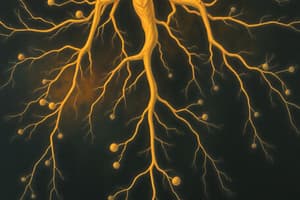Podcast
Questions and Answers
What does the lymphatic system maintain in the body?
What does the lymphatic system maintain in the body?
homeostasis and immunity
The remaining fluid that enters the lymphatic capillaries is called ______.
The remaining fluid that enters the lymphatic capillaries is called ______.
lymph
How many liters of fluid pass from the blood capillaries into the interstitial spaces each day?
How many liters of fluid pass from the blood capillaries into the interstitial spaces each day?
- 450L
- 30L (correct)
- 27L
- 3L
What role do lacteals play in the lymphatic system?
What role do lacteals play in the lymphatic system?
The spleen's functions include destroying defective white blood cells.
The spleen's functions include destroying defective white blood cells.
Which of the following substances does lymph NOT contain?
Which of the following substances does lymph NOT contain?
The thymus is responsible for the maturation of ______ cells.
The thymus is responsible for the maturation of ______ cells.
What do lymph nodes filter?
What do lymph nodes filter?
What term is used for the unfiltered lymph fluid that flows into a lymph node?
What term is used for the unfiltered lymph fluid that flows into a lymph node?
Study Notes
Lymphatic System Functions
-
Fluid Balance: Maintains homeostasis by removing excess fluid from interstitial spaces.
- 30L of fluid leaves the bloodstream
- 27L returns to the bloodstream
- 3L enters the lymphatic capillaries as lymph
- Prevents edema and tissue damage
-
Lipid Absorption: Absorbs fats and other substances from the digestive tract through lacteals.
- Lacteals are lymphatic vessels in the lining of the digestive tract
- Transports fats and proteins back to the bloodstream
-
Defense: Protects against foreign invaders
- Produces and releases lymphocytes (white blood cells)
- Monitors and destroys bacteria, viruses, parasites, and fungi
-
Transport and Waste Removal: Transports waste products and abnormal cells from the lymph.
Lymphatic System Components
-
Lymph: Clear, watery fluid circulating through lymphatic vessels.
- Drains excess fluid from cells and tissues
- Contains proteins, minerals, fats, damaged cells, cancer cells, and germs
-
Lymph Nodes: Bean-shaped organs that filter and process the immune system.
- Filter lymph fluid
- Contain white blood cells (WBCs) to fight infection
- Afferent lymphatic vessels carry unfiltered lymph into the node
- Efferent lymphatic vessels carry filtered lymph out of the node
- Cortex contains a high concentration of lymphocytes
- Inner medulla is less cellular
-
Lymphatic Vessels: Transport lymph back to the bloodstream.
- Converge into larger vessels called lymphatic trunks
- Valves prevent backflow of fluid
Other Lymphoid Organs
-
Spleen: Destroys damaged red blood cells, detects foreign substances in the blood, and acts as a blood reservoir.
- Plays a key role in immune system response
-
Thymus Gland: Site for T-cell maturation
- Secretes thymosin, a hormone important for T-cell maturation
-
Tonsils: Traps and removes bacteria and pathogens entering the throat.
- First line of defense in the immune system
- Form initial immunological response to infection
Studying That Suits You
Use AI to generate personalized quizzes and flashcards to suit your learning preferences.
Related Documents
Description
This quiz covers the functions and components of the lymphatic system, including fluid balance, lipid absorption, defense mechanisms, and waste removal. It highlights how the lymphatic system plays a crucial role in maintaining homeostasis and protecting against foreign invaders.




